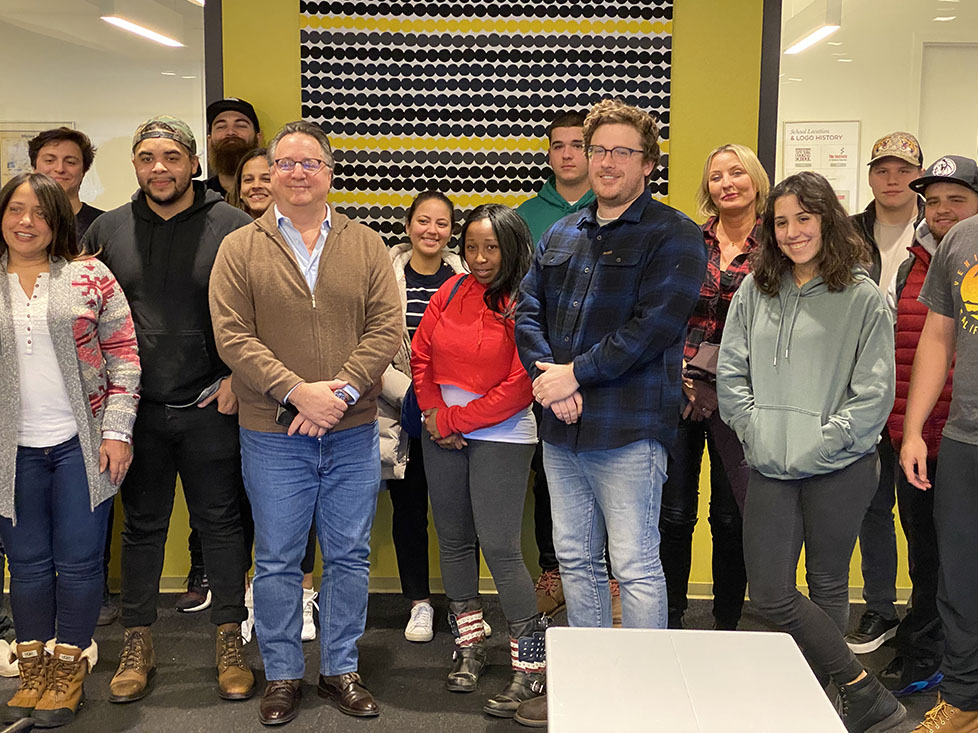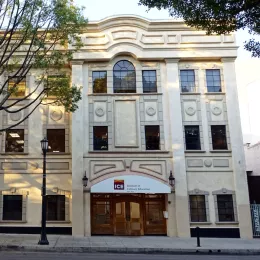Vinny Milburn's family has been in the fish business for more than 100 years. His great-great-grandfather became a fisherman when he immigrated from Ireland to Massachusetts in the 1840s, and Vinny worked for the multi-generational wholesale fish company in America's seafood hub for most of his life.
When he left the business and moved from Boston to New York, Vinny was surprised he couldn't find good seafood in his Brooklyn neighborhood, Greenpoint. "I decided to open my own store and bring in fish from my contacts, fishermen that I worked with for years," he reflected during a Meet the Culinary Entrepreneurs lecture at our New York campus. "I had a pretty good leg up on the supply chain and started a small fish market with a restaurant component."
As the restaurant became more popular, Vinny developed relationships with chefs in the neighborhood negotiating wholesale prices and transitioning back into the wholesale business with a unique, three-part business model.
"I’m the wholesale supplier to my own restaurant and we only sell seafood," he explained. "We have a tuna burger, tuna meatballs, swordfish steaks, salmon belly bacon ... I keep everything at a very flat rate. The restaurant is one of 116 wholesale customers.

Here are five highlights from his restaurant and wholesale management insights.
On opening a restaurant in New York:
The biggest thing — and this is why it’s hardest in New York — is that everything is a surprise. As soon as you open up walls, you don’t really know what’s in there, and even though you have pulled permits, the last 10 people before you probably didn’t, and not everything is done to code. Even if you get an estimate, the second you open it up and look at it, that’s right out the window. It’s scary, you don’t know what’s there unless you’re doing new construction in the middle of the country. In New York, you have no idea. Going into it with the expectation that you’re going to spend some money to do it right will help you sleep better at night.
On managing employees:
The wholesale facility has an extremely small crew, it’s six guys and drivers. For the size of the company that it is, it’s very small and everyone pitches in. I’m the accountant, the purchaser, HR, I do all of that. I also cut fish, I do deliveries, I’ll do everything. At the restaurant, I always made it a point to do every single job there for at least a week. I’ve washed dishes for a couple of weeks, I cooked on the line even though I can’t cook at all. I can be there shucking, managing, waiting … I like to let everyone that works for me to know that I am not afraid to get in and do exactly what they’re doing and what I expect them to do well. At the very beginning, I wanted to learn one thing at a time. When I feel like I’ve mastered it, I hand it off. Being there and being very engaged with them, I hope that they have the same respect for me that I have for them.
On what sets Greenpoint Fish & Lobster Co. apart:
We’re all about sustainability. We don’t serve salmon, shrimp or tuna as an entree in the restaurant. We try to take something everyone knows, like a fish taco, and put a really unknown fish in there, one that’s a little bit underutilized but sustainable. So people who have been fishing in Long Island their whole lives come in, have fish tacos they enjoy, it’s bluefish and they don’t believe it. We tell them you don’t have to have cod in your fish taco, you can use other fish, and by the way, we sell this fish at our retail counter so you can bring it home. Our recipes are very simple and what we focus on is the fish. Come in and try our fish, this is how we prepare it, you can try it at home, too.
On fresh vs. frozen seafood:
I actually prefer frozen. There’s a stigma against frozen seafood, and for certain products, you can tell but otherwise, the highest quality seafood is known as FAS, which is frozen at sea. They’re out there, they catch fish, they clean it immediately and put it in a negative 40-degree freezer on the boat. As long as you defrost it the right way, it looks, feels and smells like fish they caught two minutes ago.
On restaurant PR:
We initially had a PR company for the original launch for six weeks and it did wonders for us. I fought it very hard because I didn’t see the benefit, and one of my partners insisted on it so we did it. Having someone to handle the public perception is a driving force because there’s so much noise in New York, it’s just going to get lost. You get wrapped up in your own mind: I’ve been working in this restaurant 100 hours a week for two years, of course, everyone knows it. But in reality, nobody knows it. I’m still shocked when people who live in Greenpoint say they haven’t heard of the restaurant. It blows my mind. It’s something I would absolutely build into your initial budget. It’s absolutely imperative.
For more restaurant management strategies, while developing your own business plan, pursue ICE's Restaurant & Culinary Management program.




